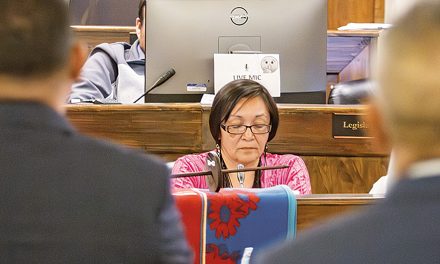
Things looking less scary for shelters after surviving a year without funds
CHINLE
The tiny woman was one of Tohdenasshai Shelter Home’s success stories.
After leaving an abusive relationship and struggling with substance abuse, she had stayed at the shelter for a while before transitioning to her own home and getting a good job within walking distance. She was happy.
Last week, her body was found behind a building.
“She was such a little thing, 80 pounds soaking wet,” said Carmelia Blackwater, director of the domestic violence shelter in Kayenta, her voice breaking. “By the time the dogs got finished with her, there wasn’t a lot left.”
Why women stay
One of the questions domestic violence advocates get tired of answering is, “Why doesn’t she just leave?” As part of educating people for Domestic Violence Awareness Month, ADABI compiled this list of possible reasons victims often stay in abusive relationships, or go back to their abusers:
• She may not have finished school.
• She is not the breadwinner.
• She takes care of the children.
• She doesn’t have a job.
• She lives 20 miles from the highway with no cell service and no vehicle.
The investigation concluded she was killed by the dogs, but Blackwater has her doubts. It wouldn’t be the first time a woman had worked her way out of an abusive situation only to be found dead a short time later.
Often, Blackwater said, the abuser can’t stand the thought that the survivor can make it on her own. He stalks her until he learns her routine, then ambushes her.
For Blackwater, the death of her protegée was the last straw. Twenty-twenty had already been the toughest year in the shelter’s 20-plus-year history, trying to provide services during the COVID-19 pandemic while its annual federal grant was tied up in tribal red tape.
All seven of the domestic violence programs that serve the Navajo Nation have gone an entire fiscal year without the government funding that provides the backbone of their services, but for the two on the Navajo Nation — Tohdenasshai in Kayenta and Amá dóó Alchini Bighan Inc. in Chinle — it was particularly egregious as they don’t get most of the state and municipal grants the off-reservation shelters use to bolster their budgets.
“I kind of had a breakdown,” admitted Blackwater. “I went home and took a long walk with my dog. I told him everything, and I felt better.”
Lorena Halwood does not think Blackwater is crazy for telling her troubles to a dog.
“Nobody understands what we go through,” sighed the director of ADABI. “I’ve been on the verge of a breakdown this whole year.”

Navajo Times | File
Domestic violence prevention advocate John Tsosie leads a walk in August to bring awareness to the lack of funding for the Navajo Nation’s domestic violence shelters.
Halwood had had a rough week too. The special needs daughter of one of her former clients, a woman who had triumphantly marched in a domestic violence awareness walk just two months ago, passed away Saturday as Halwood waited with the family outside the hospital.
The girl wasn’t a direct victim of abuse, but the mother and daughter, who were still living on her abusive partner’s family’s land while he was in jail, had been continually harassed by the abuser’s family, Halwood said. They had recently moved into a travel trailer on her own family’s land.
“It’s certainly possible that all that stress could cause a heart attack in someone who already had some serious conditions,” Halwood said. “It’s an example of how a batterer, even if he’s in prison, still has control over his victim. And people wonder why women don’t leave.”
Somehow, with the help of private donations and a strong new ally — the Dzil Asdzaan Command Center founded by Radmilla Cody, Amy Yeung and Chenoah Bah Stillwell-Jensen — the shelters got through the entire year without a penny from the tribe.
“Thanks to those ladies, we’re finally able to breathe,” said Halwood.
And now, they’re daring to hope the breathing will be easier in fiscal 2021, which started Oct. 1.
Halwood has been told her invoices from the past year will be paid, and so far she has received $224,000 of the $250,000 she usually gets. Blackwater is hoping her program will be next, although she figures her payments could be delayed while the controller’s office processes all the Coronavirus Aid, Relief and Economic Security Act funds — of which the shelters received exactly zero dollars even though they have had to alter their procedures drastically to accept COVID-positive victims.
More importantly, a major change is in the works that could eliminate the annual headache of waiting for their contracts to wind their way through the infamous signature approval system, which delays their funding for months even during years that are not 2020.
The Division of Social Services finally agreed to Blackwater’s suggestion to make the contracts for three years instead of one.
“I’m so grateful they actually listened to Carmelia’s suggestion,” said Halwood. “I’m so hoping we don’t have to go through this nightmare again.”
Halwood said she’s been informed her fiscal 2021 contract is on President Jonathan Nez’s desk, the final stop in the elaborate review process that is the bane of every Navajo Nation contractor. Blackwater has been informed hers is ready to sign.
(No one answered the phone at DSS Director Deannah Neswood-Gishie’s desk to confirm the contracts’ status.)
Once they get their three-year contracts in the bag, the women said the next push will be for victims’ advocates in the courts and police department.
“There are no direct victim services with the tribe,” explained Blackwater. “We have to fill that role, and we’re not tribal employees.”
The DV program staffers — and often Blackwater and Halwood themselves — spend precious hours away from their offices to sit with a victim in court or try to correct a police report that contains wrong information because the victim was too upset to be interviewed or only spoke Navajo.
Halwood said she had heard the Navajo Nation Prosecutor’s Office in Chinle is in the process of hiring an advocate, which would free her up considerably.
“A long, long time ago all the courts had advocates, and it made our job so much easier,” she said.
Erica Christie with the prosecutor’s office did not return an email by press time to confirm the plan.
This month is Domestic Violence Awareness Month, which normally would have entailed demonstrations, education sessions and a dinner to honor the police who are often the victim’s first line of defense. But with COVID once again raging on the reservation, the shelters have toned down their game.
Tohdenasshai gave out bags to the local police with Halloween candy and DV information; ADABI surprised the Chinle police with a delivery of pizza and hot wings.
As this article went to press, both programs were preparing for their annual candlelight vigils for victims of DV; Tohdenasshai held its yesterday and ADABI’s will be tomorrow at 5 p.m.
The event is open to the public at the ADABI office, but Halwood is asking participants to mask up and stand six feet apart.
Information: https://www.domesticshelters.org/help/az/kayenta/86033-1510/tohdenasshai-committee-against-family-abuse, www.adabihealingshelter.org, https://www.orendatribe.com/spread-love-shine-light-1/spread-love-shine-light-sweatsuit-grey-heather-ap3md








 Highway 264,
Highway 264, I-40, WB @ Winslow
I-40, WB @ Winslow